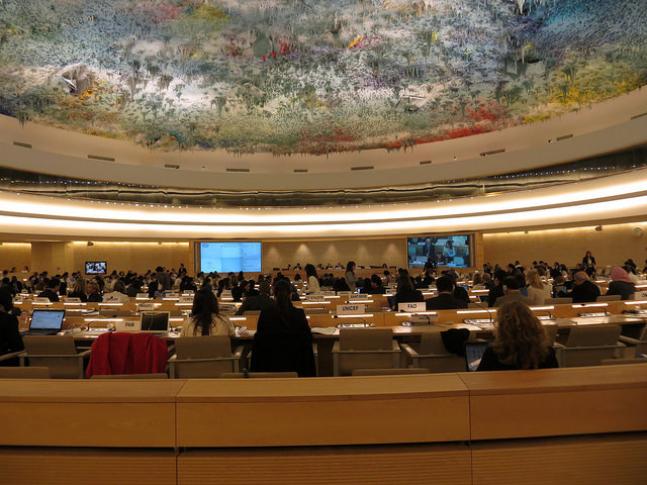
Turkey: Secure digital communications are essential for human rights
Oral statement at the UN Human Rights Council 36th session
19 September 2017
Thank you, Mr. President.
The Association for Progressive Communications (APC), IFEX, Access Now, ARTICLE 19, Front Line Defenders, Privacy International and 60 organisations from around the globe express our grave concern about the growing crackdown by states on the use of secure digital communications – encryption, virtual private networks, and similar technologies. We believe this crackdown both violates states’ human rights obligations under international law, and seriously undermines both the safety of human rights defenders and the economic and social benefits that digital technology provides.
Many governments, including Australia and the United Kingdom, have recently threatened to legislate “backdoors” to encryption, enabling them to access private communications when they believe they have a justification for doing so. Backdoors expose all communications running through them to potential compromise by malevolent actors, including criminals, stalkers and terrorists.
An equally worrying trend is states’ treating the use of secure communications as a crime, or as evidence of “terrorist” activity. In particular, we highlight Turkey's recent arrest and continued pre-trial detention of IT consultant Ali Gharavi and non-violence trainer Peter Steudtner at a digital security and information management workshop on 5 July of this year.
Gharavi and Steudtner were arrested doing their jobs, imparting knowledge and skills that are essential to the exercise of human rights in the digital age, as they have done for many years with civil society groups around the world. Secure digital communications can often be the only safe outlet for free expression for those persecuted for their religion, ethnicity, sexual identity, personal beliefs or for promoting human rights. Turkey’s decision to criminalise this knowledge sharing as aiding “terrorism” is indefensible, and sets a dangerous precedent for the handling of this expression-enabling activity that should be part of any healthy democracy.
In March the Council urged states not to interfere with the use of secure digital communications. We request the Council to actively:
-
Work with states to ensure the internet is a space that fosters rather than limits the exercise of all recognised human rights
-
Monitor efforts by member states to restrict or compromise the use of secure digital communications.
We further call on the government of Turkey to:
-
Drop all charges against Gharavi, Steudtner and the eight human rights defenders arrested with them.
-
Cease criminalising the use of secure digital communications.
Thank you.
List of signatories:
-
Access Now*
-
ARTICLE 19*
-
Association for Progressive Communications*
-
Front Line Defenders*
-
International Service for Human Rights*
-
Privacy International*
-
7amleh - Arab Center for the Advancement of Social Media
-
ActiveWatch – Media Monitoring Agency
-
Africa Freedom of Information Centre (AFIC)
-
Albanian Media Institute
-
Alternatives
-
Americans for Democracy & Human Rights in Bahrain (ADHRB)
-
Association for Civil Rights
-
Association of Caribbean Media Workers
-
BlueLink
-
Brazilian Association for Investigative Journalism
-
Bytes for All (B4A)
-
Canadian Journalists for Free Expression
-
Cartoonists Rights Network International (CRNI)
-
Center for Media Studies & Peace Building (CEMESP)
-
Child Rights International Network (CRIN)
-
Centre for Information Technology and Development
-
Código Sur
-
Derechos Digitales
-
Digital Rights Foundation
-
Digital Society of Zimbabwe
-
Electronic Frontier Foundation (EFF)
-
EngageMedia
-
eQualit.ie
-
Fantsuam Foundation
-
Foundation for Press Freedom (FLIP)
-
Freedom Forum
-
Free Media Movement
-
Global Partners Digital
-
Global Voices Advox
-
Globe International Center
-
GreenNet
-
Gulf Centre for Human Rights (GCHR)
-
I'lam Arab Center for Media Freedom Development and Research
-
Index on Censorship
-
Internet Democracy Project
-
Initiative for Freedom of Expression - Turkey
-
Instituto Prensa y Sociedad de Venezuela
-
International Federation of Journalists (IFJ)
-
International Press Centre (IPC)
-
LaborNet
-
Mediacentar Sarajevo
-
Media, Entertainment and Arts Alliance
-
Media Institute of Southern Africa (MISA)
-
Media Watch
-
Nodo TAU
-
Norwegian PEN
-
Nupef
-
One World Platform
-
OpenMedia
-
Pacific Islands News Association
-
Pangea
-
PEN Canada
-
PEN International
-
Reporters Without Borders (RSF)
-
Rhizomatica
-
SFLC.in
-
Southeast Asian Press Alliance
-
South East European Network for Professionalization of Media
-
Swedish PEN
-
Vigilance for Democracy and the Civic State
*Indicates the NGO is in consultative status with ECOSOC